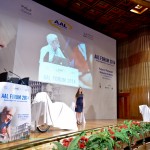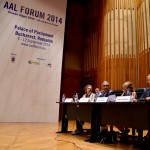2014 best project
The AAL Award goes to Confidence
The contest, which featured the pitching of three finalist’s projects, was held on 10 September during a plenary session of the Forum of the AAL Programme in Bucharest (Romania) and was presented on stage by Romanian TV journalist Irina Pacuriaru. All contenders were challenged in a “dragon’s den” by a panel of four renowned experts in the field of technology, business and end users and the final vote. For the first time, the programme decided to institute two separated prizes. The institutional prize, resulting from the judgement of the panel, which was entitled to the memory of former AAL Advisory Board member, Jeroen Wals, who together with his family died in the tragic air crash over the skies of Ukraine; the public prize, resulting from the vote of the public.
This award was intended to recognize the most promising project of the Ambient Assisted Living Joint Programme that demonstrates great promise in terms of innovation, human-centric approaches to development and market potential. The competition was a three months process along a three steps selection, which was participated by 13 projects of the AAL Joint Programme. For the first time the main award was worth a financial prize of € 5000, which is intended to help the winner to bring the project to go to market.
The three finalists were the projects Assam, Age in Balance and Confidence.
The project Confidence, which is led by the Salzburg Research Institute in Austria won the competition. It aim is to develop a community-based mobility safeguarding assistance service for people suffering from mild to moderate dementia. Confidence combines “assistive technologies” with “personal help”. The Confidence service is built around a “virtual companion” providing different levels of assistance, depending on the situational needs of the patient and the degree of orientation loss. The service is supplemented with personal help from family members, staff of home care agencies and/or trusted volunteers.
The other two finalists addressed different types of needs.
The Assam project aims to compensate for declining physical and cognitive capabilities of elderly persons by user-centred development of modular navigation assistants for various mobility platforms, such as walker, wheelchair, and tricycle, enabling sustained everyday mobility and autonomy with seamless transition from indoors to outdoors in environments such as residential complexes, the neighbourhood quarter, or touristic areas. Modular assistance systems provide obstacle avoidance, navigational aid, cognitive assistance for visual impairment, and security by connection to a care centre in emergency situations.
The Age in Balance provides a unique composition of technologies for supporting the fall prevention process. In addition to the process management tool, the product has integrated components for comprehensive fall risk assessment, short or quick assessment, self-assessments, assessment with sensors and technologies for fall prevention interventions. The set of tools can be modified according to the needs of the buyer to support a) organisations own fall prevention process, b) fall risk assessment as part of geriatric assessment, c) chosen variety of fall risk assessments, d) patient activation, and e) self-management of fall risk. The product will be sold, depending on the underlying health structure, to municipalities, insurance companies, hospitals and health districts, who are willing to make efforts on preventing falls and fall related injuries.


